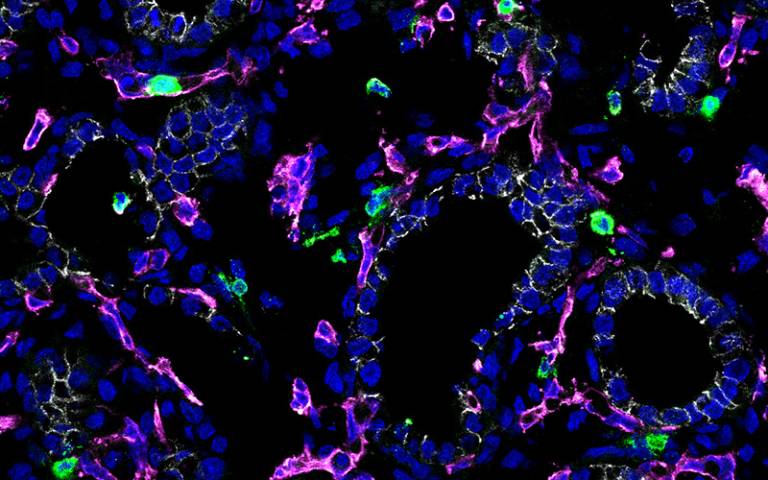Immune cells could offer new avenues for treating respiratory diseases
15 December 2023
Healthy lung development hinges on communication between immune cells and cells that line the airways, according to new research from UCL and the Wellcome Sanger Institute, with implications for the treatment of respiratory diseases.

The study, published in Science Immunology, has created a first-of-its-kind immune cell atlas of the developing lung,revealing coordination between the immune and respiratory systems much earlier in development than previously thought.
This discovery raises questions about the potential role of immune cells in other developing organs across the body and offers new insights for understanding and treating respiratory conditions, such as chronic obstructive pulmonary disease (COPD).
Globally, respiratory conditions account for almost 20 per cent of all deaths in children under the age of five.
In this study, researchers from UCL, the Wellcome Sanger Institute and EMBL’s European Bioinformatics Institute used advanced single-cell technologies to map the development of early foetal human lung immune cells over time.
Immune cells make up a substantial portion of the airways and mature lungs, which have critical gas exchange and barrier function, providing protection against infection of the respiratory tract. However, the roles of immune cells in the developing organ have remained unexplored compared to structural or lining cell types. Recent discoveries confirm the presence of immune cells in human lungs as early as five weeks into development.
To explore whether the immune system might influence how lungs grow, the team studied immune cells in early human lungs from 5 to 22 weeks of development. They used various techniques, including single-cell sequencing and experiments with lung cell cultures, to see if immune cells could affect lung cell development.
The team found that immune cells play an active role in directing the growth of human lung tissue during development. They identified regulators of lung development, including signalling molecules such as IL-1β and IL-13 that facilitate the coordination of lung stem cells maturing into specialised cell types.
Dr Jo Barnes, a first author of the study from UCL Division of Medicine, said: “Our study shows that there is a symbiotic relationship between immune cells and the developing foetal lungs – some immune cells use the lungs as a developmental niche, preparing for exposure to an onslaught of pathogens at birth, while other immune cells help shape the lung tissue. Knowing that immune cells can affect tissue modelling in the developing lungs opens the door to potential regenerative therapies in not just the lung, but in other human organs.”
The researchers detected an infiltration of innate immune cells followed by adaptive immune cells. Innate cells included innate lymphoid cells (ILCs), natural killer (NK) cells, myeloid cells and progenitor cells. With respect to adaptive immune cells, as well as T cells, both developing and mature B lineage cells were detected, indicating that the lung environment supports B cell development.
Dr Marko Nikolić, Honorary Consultant in Respiratory Medicine from UCL Division of Medicine and senior author of the study, said: "We now know immune-epithelial crosstalk is a feature of early lung development. This vital baseline of healthy lung development will help us understand what happens when lung developmental processes get disrupted, for example in preterm births, which can lead to respiratory deficiencies.”
The findings fundamentally change the understanding of the immune and epithelial interactions that are crucial for foetal lung maturation. They also suggest that early immune disturbances could manifest as paediatric lung disease.
These new insights into mechanisms in early lung formation, will also contribute to the development of new therapeutic approaches for regenerating damaged lung tissue and restoring lung function.
Dr Kerstin Meyer, senior author of the study at the Wellcome Sanger Institute, said: “The active participation of immune cells expands the possibilities for understanding and addressing impaired lung formation. What is super exciting about this mechanism is that it may well apply in other organ systems too.”
The study is part of the international Human Cell Atlas initiative, which is mapping every cell type in the human body, to transform our understanding of health, infection and disease.
This research was supported by the Medical Research Council, Wellcome and Rosetrees Trust.
Links
- Dr Jo Barnes's academic profile
- Dr Marko Nikolic's academic profile
- UCL Division of Medicine
- UCL Faculty of Medical Sciences
Image
- Credit: Marko Nikolic & Jo Barnes/UCL.
Media contact
Dr Matt Midgley
E: m.midgley [at] ucl.ac.uk
 Close
Close

